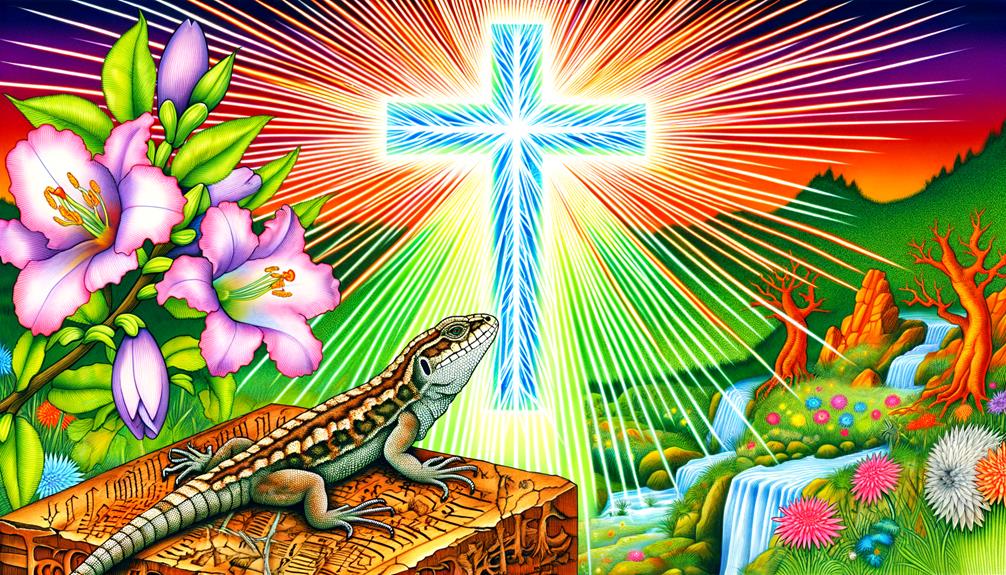Lizard Meaning In The Bible: Symbolism and Survival
In the Bible, lizards are referenced sparingly but with significant symbolic undertones. Leviticus 11:29-30 classifies lizards as unclean, highlighting ancient purity laws and moral boundaries.
Proverbs 30:28, however, depicts the lizard’s adaptability and unnoticed influence in royal settings, presenting a nuanced view of its significance. Theologically, lizards embody themes of vulnerability, resilience, and divine protection amidst adversity.
They serve as metaphors for moral vigilance, spiritual impurity, and ethical conduct. These elements invite deeper reflection on the theological implications of such a humble creature within biblical narratives.
Insights into spiritual endurance and divine lessons await further exploration.

Lizard Meaning in the Bible: Symbolism, Purity Laws, and Spiritual Insights
| Aspect | Details |
|---|---|
| Term | Lizard |
| Biblical Reference | Leviticus 11:29–30 |
| Context | Listed among unclean creeping creatures in Mosaic Law |
| Symbolic Meaning | Often associated with uncleanness, but also subtle wisdom |
| Cultural Insight | In Proverbs 30:28 (some translations), a lizard is seen as clever |
| Spiritual Lessons | Discernment, spiritual cleanliness, humility |
| Theological Significance | Differentiates clean vs. unclean, pointing to holiness in daily life |
Biblical References to Lizards

Biblical references to lizards are sparse but carry significant symbolic and theological implications when examined within their historical and cultural contexts.
In Leviticus 11:29-30, lizards are listed among creatures deemed unclean, reflecting the ancient Israelites’ intricate purity laws. The inclusion of lizards in the list of unclean animals is not arbitrary; it underscores a broader theological framework that delineates the boundaries of holiness and impurity.
Additionally, Proverbs 30:28 mentions the lizard’s ability to be in kings’ palaces, suggesting adaptability and subtle influence. This duality—unclean yet adaptively present in esteemed places—invites deeper reflection on the complex interplay between ritual purity and everyday existence in biblical narratives, offering fertile ground for theological interpretation and scholarly exploration.
Symbolism of Vulnerability

The symbolism of vulnerability in the Bible often finds a poignant representation in the figure of the lizard, embodying themes of fragility and resilience within the broader tapestry of biblical narrative and theology. Lizards, often depicted in precarious environments, reflect the human condition of exposure and dependency on divine protection.
| Symbol | Meaning |
|---|---|
| Lizard | Vulnerability |
| Nest | Safe Haven |
| Desert | Harsh Conditions |
| Shelter | Divine Protection |
| Path | Life’s Journey |
These elements in biblical symbolism evoke a profound emotional response, urging readers to reflect on their vulnerability and the shelter provided by faith. The lizard’s delicate existence underscores God’s omnipresent care, reminding believers of their dependence on His providence amidst life’s adversities.
Survival and Resilience

In the context of biblical narratives, the lizard emerges as a potent symbol of survival and resilience, illustrating the capacity to endure and thrive despite formidable challenges.
The lizard’s ability to navigate harsh environments and adapt speaks to themes of perseverance found throughout scripture.
Theologically, this resilience can be seen as a reflection of divine providence, where God’s grace enables creations to withstand and overcome adversity.
By embodying these traits, the lizard serves as a metaphor for the faithful who, through reliance on divine strength, navigate life’s trials.
This symbolism invites readers to reflect on their own spiritual fortitude and God’s sustaining power in their journey through life’s metaphorical deserts and wildernesses.
Lizards in Leviticus

Leviticus 11:29-30 specifically lists lizards among the creatures deemed unclean, highlighting their significant role within the dietary laws and purity codes of ancient Israel.
This classification underscores the theological framework that governed Israelite life, where distinctions between clean and unclean animals maintained ritual purity.
The unclean status of lizards, along with other small creatures, reflects an ancient worldview that associated certain animals with impurity and potential contamination.
This demarcation served not only as a dietary guideline but also as a metaphor for spiritual and moral boundaries.
Consequently, the inclusion of lizards in Leviticus underscores the intricate relationship between physical practices and spiritual symbolism in biblical law, emphasizing the holistic nature of Israelite covenantal obedience.
Proverbs and Deceit

Proverbs frequently employs the imagery of deceit to illustrate the moral and ethical pitfalls that ensnare the unwary, reflecting a profound understanding of human nature and the necessity of wisdom in traversing life’s complexities.
Deceit is likened to a snare, capturing those who are not vigilant. Proverbs 12:22 underscores that ‘The Lord detests lying lips, but he delights in people who are trustworthy,’ emphasizing the divine disdain for deceit.
This wisdom literature portrays deceit as a fundamental breach of ethical conduct, leading to ruin and divine disfavor.
Theological reflection on these passages reveals the importance of integrity and truthfulness as foundational virtues for a righteous life, aligning human actions with divine expectations and fostering a just society.
Lizards in Ancient Cultures

Across various ancient cultures, lizards often held symbolic significance, representing themes that ranged from regeneration and protection to deceit and danger.
In Egyptian mythology, lizards were seen as symbols of good fortune and divine protection, closely associated with the goddess Wadjet.
Conversely, in Greco-Roman contexts, they often signified rebirth and resurrection due to their ability to regenerate lost tails. This regenerative aspect also found resonance in Mesoamerican traditions, where lizards were linked to gods of fertility and life cycles.
Theologically, these varied interpretations reflect humanity’s attempts to understand the natural world and its cycles.
In this way, examining these ancient cultural contexts provides valuable insight into the multifaceted symbolism of lizards, enriching our comprehension of their biblical connotations.
Negative Connotations

In biblical texts, lizards frequently carry negative connotations, often symbolizing uncleanness and moral degradation. Leviticus 11:30 lists the gecko among unclean creatures, which were not to be touched or consumed. This classification underscores a broader theological theme of purity and impurity, delineating boundaries between the holy and the profane.
The association of lizards with desolate places in Isaiah 34:14 further emphasizes their symbolic link to desolation and abandonment. Within this context, lizards embody a physical representation of spiritual decay and societal corruption.
Consequently, the biblical portrayal of lizards serves as a cautionary emblem, warning against behaviors and states of being that distance individuals from divine sanctity and communal integrity.
Positive Symbolism

While often associated with negative connotations, lizards in certain biblical contexts also embody resilience and adaptability, symbolizing the ability to thrive in adverse conditions.
Analyzing Proverbs 30:28, the lizard’s presence in royal palaces underscores its unexpected influence and survival skills. Theologically, this can be interpreted as a metaphor for divine providence, illustrating how God equips even the seemingly insignificant with the means to succeed.
In a broader biblical context, lizards may represent spiritual fortitude and the virtue of perseverance. This positive symbolism encourages believers to recognize the hidden strengths within themselves and trust in God’s provision, even when circumstances appear intimidating.
Consequently, lizards serve as a reminder of faith and endurance in the face of life’s challenges.
Lizards and Spirituality

In the domain of spirituality, lizards in biblical texts often embody profound symbolic meanings, reflecting broader themes of transformation and vigilance.
The usage of animal imagery in Scripture serves as a didactic tool, bridging the natural and divine to illuminate moral and spiritual lessons.
Symbolism in Scripture
Biblical references to lizards are sparse but imbued with deep symbolic significance, often reflecting themes of survival, cunning, and spiritual vigilance. Lizards, mentioned in Leviticus 11:30, are classified among the unclean animals, symbolizing spiritual impurity and moral caution.
However, their ability to thrive in harsh environments also conveys resilience and adaptability, traits valued in spiritual warfare and perseverance. These dual aspects highlight the theological complexity of lizards as symbols within Scripture.
| Theme | Symbolic Meaning |
|---|---|
| Survival | Resilience in adversity |
| Cunning | Spiritual vigilance and awareness |
| Uncleanliness | Moral and spiritual impurity |
| Adaptability | Perseverance in faith |
Such symbolism underscores the importance of discernment and spiritual alertness in biblical teachings.
Biblical Animal Imagery
Examining the broader context of biblical animal imagery, lizards serve as a profound emblem of the interplay between spirituality and the natural world. Their appearances in scripture, though sparse, are imbued with meanings that transcend mere biological representation.
In Leviticus, lizards are listed among creatures deemed unclean, symbolizing the complexities of purity laws and human frailty. However, their mention also suggests resilience and adaptability, traits essential for spiritual survival.
The theological implications of such imagery invite readers to reflect on the nuanced relationship between the physical and spiritual domains, where even the most unassuming creatures can embody divine messages. This duality underscores the depth and richness inherent in biblical symbolism, urging a deeper exploration of nature’s spiritual dimensions.
Spiritual Lessons From Lizards
The spiritual lessons derived from lizards in biblical texts underscore their role as symbols of resilience, adaptability, and the intricate balance between purity and impurity.
In Leviticus, the lizard’s classification among unclean animals highlights the importance of discernment in spiritual practices.
Lizards’ ability to thrive in harsh environments mirrors the believer’s call to remain steadfast amidst trials, embodying resilience and adaptability.
Furthermore, their nocturnal nature invites reflection on steering through darkness with wisdom and faith.
Theologically, lizards challenge readers to seek purity and spiritual growth despite life’s inherent dualities.
Contextually, these creatures illustrate the broader biblical theme of finding divine purpose and strength in seemingly insignificant or marginalized aspects of creation.
Modern Interpretations

In contemporary theological discourse, interpretations of lizard symbolism in the Bible often reflect a blend of historical context and modern spiritual insights. Scholars commonly examine the cultural and environmental factors of biblical times to understand better the texts’ original meanings.
Lizards, often seen as creatures of survival and adaptability, are interpreted within modern theology as metaphors for resilience and spiritual perseverance. Additionally, their association with desolate places can symbolize a journey through spiritual wilderness, emphasizing growth and transformation.
Theological perspectives also consider the lizard’s ability to regenerate its tail, viewing it as a potent symbol of renewal and divine restoration, aligning ancient scriptural interpretations with contemporary spiritual understandings.
Lessons for Today

Drawing from the rich tapestry of biblical symbolism, contemporary believers can derive profound lessons on resilience, renewal, and spiritual growth from the humble lizard. In biblical contexts, lizards often signify adaptability and survival in harsh environments.
By examining this symbol, modern Christians can gain insights into handling life’s challenges with faith and perseverance.
- Resilience: Just as lizards thrive in arid conditions, believers are called to endure and grow in their spiritual deserts.
- Renewal: Lizards’ ability to regenerate lost tails symbolizes the promise of spiritual renewal and restoration through faith.
- Spiritual growth: Observing the lizard’s vigilance and agility can inspire a proactive approach to spiritual discipline and watchfulness.
These lessons underscore the timeless relevance of biblical symbols in guiding contemporary faith journeys.
Conclusion
In biblical literature, lizards embody an intricate duality, representing both frailty and tenacity.
These creatures, mentioned in Leviticus and Proverbs, serve as metaphors for vulnerability and cunning deceit.
Concurrently, they symbolize survival, resilience, and positive spiritual connotations.
Modern interpretations continue to draw lessons from these ancient texts, emphasizing the enduring relevance of lizard symbolism.
Such interpretations encourage a deeper understanding of one’s existential journey, reflecting the timeless wisdom embedded within scriptural narratives.






